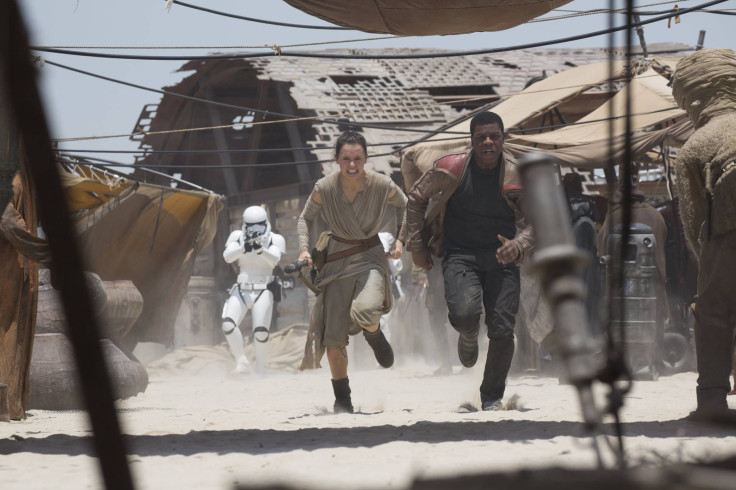Spoiler Etiquette: How Long Until We Can Talk About The End Of ‘Star Wars: The Force Awakens’?

Spoiler alert! This article is about spoilers, and therefore contains spoilers for the following films and TV series, so don’t say we didn’t warn you: “Star Wars: The Force Awakens,” “Mad Men,” “Game of Thrones,” “Breaking Bad,” “Downton Abbey” and “The Wire.”
That “Star Wars: The Force Awakens” wasn’t leaked online stands as both a minor miracle and a testament to the iron will of distributor Disney, which fought to keep sensitive details about the year’s most anticipated movie secret. But perhaps the bigger miracle was the relative lack of spoiling for fans who had waited as long as a week after the movie’s Dec. 18 release date to actually get to a theater and see it. At no point during that first week did (again: spoiler alert) the hashtag “RIPHan” start trending on Twitter or Facebook. “Star Wars”-related headlines were appropriately vague and reviews of the movie were downright pristine.
That in itself shouldn’t be considered a miracle, but we live in world in which certain online denizens take delight in revealing the important plot points of popular movies or TV series. And they find numerous ways to do so, whether by wading into a comment section and smugly announcing, “Well, Robb dies next season, so don’t get too attached!” or live-tweeting the finale of "Breaking Bad" during its East Coast airing from the Twitter account of a popular entertainment magazine.
How Soon Is Too Soon?
There is no real consensus on the proper length of time between an episode’s airing, or a movie’s premiere, and when it’s OK to blab in a public forum. “It used to be closer to a few days after something aired or came out,” says Vox culture editor Todd VanDerWerff. “And it increasingly feels like it's a few weeks, if not a full month.”
Matt Roush, the critic for TV Guide (and a former colleague of this reporter), takes a more permissive stance. “I figure once a show has aired, it's no longer a spoiler,” he says. “I've had quite a few things spoiled to me when I open up my email bag, because I can't possibly watch everything our readers are (not in real time, anyway), and I've learned to live with it.”
Roush recalls whiling away a quiet Christmas afternoon on Twitter a few years ago, only to be spoiled on the sudden death of cousin Matthew of “Downton Abbey,” which aired in the U.K. months before it aired in the United States. The Brits in his Twitter feed went nuts. “If you don't want to be spoiled on something, I've learned it's best not to call up the story,” he says.

“Mad Men” creator Matthew Weiner took spoilerphobia to new heights during the run of his popular period drama, at one point asking critics not to reveal even the year in which the action took place. And paparazzi photos of the cast sitting around in costume were considered “spoilers.”
“Weiner’s requests were so absurd,” says Roush. “It almost made people want to spoil the bigger stuff.”
Media Matters
Fifteen years ago, the pop-culture world was a kinder, gentler place. Most people watched shows as they aired, or accepted that they just might run across some information they didn’t want to know. Online forums had clearly labeled spoiler threads, as did columns that existed solely to sate fans looking to consume every last crumb of information about their favorite shows.
But with the rise of on-demand platforms and time-shifted viewing, consumers are increasingly watching their favorite movies and TV shows on their own time, and as a result may expect would-be spoilers to accommodate them accordingly. Meanwhile, entertainment sites and social media have become the equivalent of a Minesweeper game for the spoiler-averse. Trade publications, for instance, have discovered the unending fountain of web traffic that comes with casting news for popular series and movies, regardless of what information that might reveal about upcoming storylines.
Patricia Napier-Fitzpatrick, founder of The Etiquette School of New York, says the etiquette around spoilers should still be clear, whether discussions are occurring online or in person. “Always ask if they’ve seen what you’re talking about,” she says. “Treat them with the same respect online as you would face to face.”
On social media platforms, though, where messages are often directed at a larger, more general audience, it’s wisest just to mute or unfollow certain people during the time in between a show or movie’s release and your viewing. And if you’re in an online discussion with someone with a large number of followers, take it to a less public forum — just as you would in an office.
After public discourse has reached a critical mass, though, the onus is on the straggler to take responsibility for not having seen the movie or show. “I never mind throwing a spoiler warning on things,” says VanDerWerff. “But I think if you go through life convinced you're about to be spoiled on something, that's inevitably going to lead to you feeling like you were spoiled, perhaps even when you weren't.”
Oh, and Omar gets murdered by a child at the end of “The Wire.”
© Copyright IBTimes 2025. All rights reserved.






















